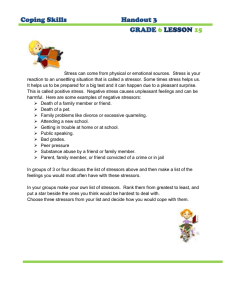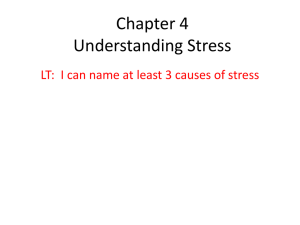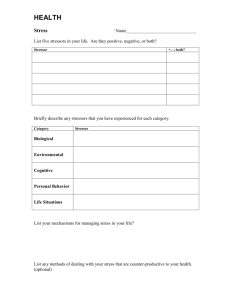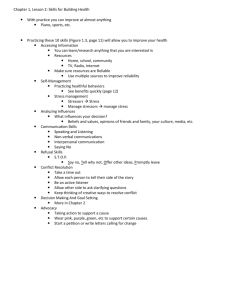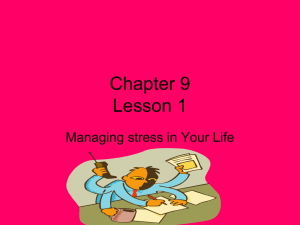Controlling Stress For most people, stress is a fact of life.
advertisement
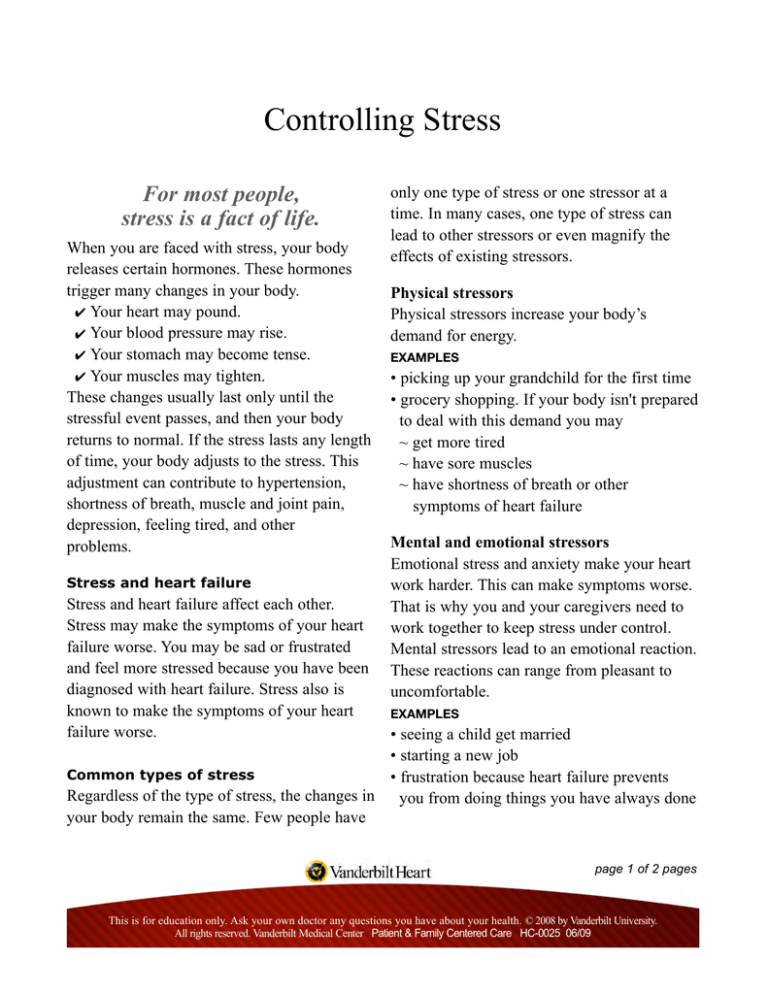
Controlling Stress For most people, stress is a fact of life. When you are faced with stress, your body releases certain hormones. These hormones trigger many changes in your body. Your heart may pound. Your blood pressure may rise. Your stomach may become tense. Your muscles may tighten. These changes usually last only until the stressful event passes, and then your body returns to normal. If the stress lasts any length of time, your body adjusts to the stress. This adjustment can contribute to hypertension, shortness of breath, muscle and joint pain, depression, feeling tired, and other problems. Stress and heart failure Stress and heart failure affect each other. Stress may make the symptoms of your heart failure worse. You may be sad or frustrated and feel more stressed because you have been diagnosed with heart failure. Stress also is known to make the symptoms of your heart failure worse. only one type of stress or one stressor at a time. In many cases, one type of stress can lead to other stressors or even magnify the effects of existing stressors. Physical stressors Physical stressors increase your body’s demand for energy. EXAMPLES • picking up your grandchild for the first time • grocery shopping. If your body isn't prepared to deal with this demand you may ~ get more tired ~ have sore muscles ~ have shortness of breath or other symptoms of heart failure Mental and emotional stressors Emotional stress and anxiety make your heart work harder. This can make symptoms worse. That is why you and your caregivers need to work together to keep stress under control. Mental stressors lead to an emotional reaction. These reactions can range from pleasant to uncomfortable. EXAMPLES • seeing a child get married • starting a new job Common types of stress • frustration because heart failure prevents Regardless of the type of stress, the changes in you from doing things you have always done your body remain the same. Few people have page 1 of 2 pages This is for education only. Ask your own doctor any questions you have about your health. © 2008 by Vanderbilt University. All rights reserved. Vanderbilt Medical Center Patient & Family Centered Care HC-0025 06/09 Environmental stressors Environmental stressors are a part of your surroundings. They could be almost anything. EXAMPLES • secondhand smoke • uneven sidewalks that make it difficult to walk • loud noise that affects your sleep Controlling your stress Stress is a part of life. Learning ways to manage stress can help you feel better both physically and emotionally. Many strategies for managing stress are effective. It is important to find several that work for you. Remember, learning to manage your stress is a step toward your doctor’s goals for you. Steps to gain control over stress worked in other situations and try it again. • Do something fun on a regular basis. It might be listening to music, fishing, woodworking, or reading. Smoking a cigarette, drinking a glass of wine or a cup of coffee actually increase the body's stress response. These strategies do not soothe tension. • Set limits and learn to say "No." Do not promise too much. Give yourself enough time to get things done. • Try to be more flexible. • Get close to somebody. • Remember to laugh! • Get professional help if you feel like you are not able to make these changes. Consider a mental health professional or someone from your church. • Join a support group. You might find one for people with heart disease, for women, for men, for retired persons or some other group that you would enjoy. • Get plenty of sleep. It helps you feel energized to cope with the day ahead. • Eat a balanced diet. It will help keep you alert and on the ball. • Exercise regularly. Taking a walk can be a great way to let off steam and have a break. • Identify the sources of your stress. Remember, it may not be your heart failure. It may be another stressor that you have ignored. • Divide this list of stressors into things you can and can’t control. Learn to accept things you can't change. You do not have to solve all of life's problems. • If you know that certain situations will bother you, develop ways to deal with them before they happen. Think about what has Patient & Family Centered Care HC-0025 06/09 Goals for your doctor's treatment plan for you • prevent the disease from getting worse quickly • improve how you feel • possibly live a longer life page 2 of 2 pages

